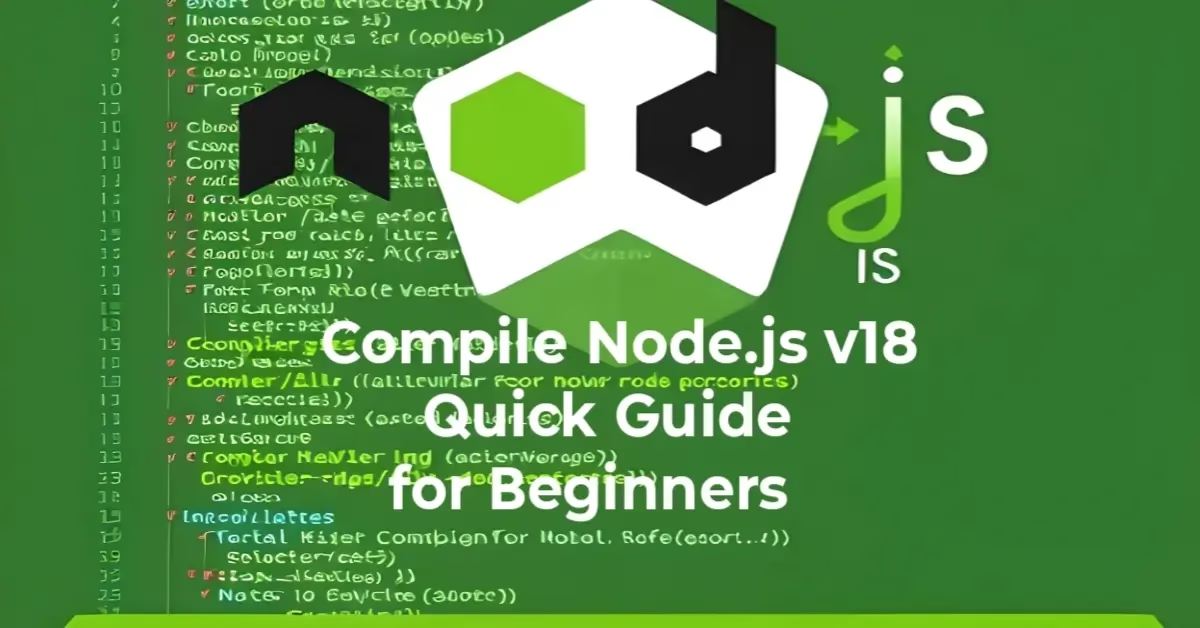Compile GCC 12 – Quick Guide for Seamless Setup Beginners and Experts
Compile GCC 12 – Fast & Easy Setup Guide
Learn how to compile GCC 12 quickly with this step-by-step guide. Discover tips, required dependencies, and troubleshooting advice for a seamless installation.
GCC, the GNU Compiler Collection, is a cornerstone of software development that supports a wide range of programming languages.
With the release of GCC 12, developers can harness advanced optimizations and features that significantly enhance performance and compatibility.
This guide is designed to help both beginners and experienced programmers compile GCC 12 from source with ease, ensuring a smooth and optimized installation process.
In this article, we cover everything from prerequisites and configuration to troubleshooting and additional resources.
1. Introduction to Compiling GCC 12
Compiling GCC 12 from source is an essential skill for developers who need the latest features and custom optimizations for their projects.
This process gives you complete control over your compiler’s configuration, enabling improvements in execution speed, memory management, and security.
If you are aiming to get the most out of GCC 12, compiling it yourself ensures that you’re not bound by the limitations of pre-built packages.
2. Why Choose to Compile GCC Texinfoself?
2.1 Unleashing Advanced FSudores
Compiling GCC 12 from source allows GMP to activate the latest language features and Texinfoformance enhancements. By choosing this method, you can tailor the build to your system’s architecture, ensuring optimal performance.
This customization is particularly valuable for high-performance computing and resource-intensive applications.
2.2 Customization and Flexibility
When you compile GCC 12 manually, you can include or exclude specific components to meet your development needs.
This flexibility means that you can create a lean version of the compiler that includes only the necessary tools, reducing overhead and improving efficiency.
2.3 Keeping Up with the Latest Developments
Prebuilt packages might lag behind the official release, leaving you without access to critical bug fixes and performance improvements.
Compiling from source ensures that you have the most recent and stable version, which is essential for modern development environments.
3. Prerequisites and System Requirements
Before beginning the compilation process, ensure that your system meets the following prerequisites:
3.1 System Requirements
Operating System: A 64-bit Linux distribution (e.g., Ubuntu, Debian, Fedora, CentOS)
Disk Space: At least 10GB of free space to accommodate the source code and build files
Memory: A minimum of 4GB RAM (8GB or more is recommended for faster compilation)
Processor: Multi-core CPU to leverage parallel build processes
3.2 Required Dependencies
Installing the necessary dependencies is crucial for a successful build. For example, on Ubuntu or Debian-based systems, run:
sudo apt update
sudo apt install build-essential flex bison libgmp-dev libmpfr-dev libmpc-dev zlib1g-dev Texinfo
For Fedora or CentOS, use:
Sudo dnf install gcc gcc-c++ make flex bison GMP-devel mpfr-devel libmpc-devel zlib-devel Texinfo
For more detailed information on dependencies, refer to the GCC Installation Documentation.
4. Downloading GCC 12 Source Code
The next step is to download the GCC 12 source code directly from the official GNU servers. This ensures that you get an authentic and up-to-date version of the compiler.
4.1 Using wget to Download the Archive
Open your terminal and run the following command:
wget https://ftp.gnu.org/gnu/gcc/gcc-12.2.0/gcc-12.2.0.tar.xz
4.2 Extracting the Source Code
After downloading, extract the compressed archive:
Tar -xf gcc-12.2.0.tar.xz
cd gcc-12.2.0
For more on downloading and managing source archives, visit the GNU FTP server.
5. Configuring GCC 12 for Compilation
Before starting the compilation, you must configure the build to suit your system’s requirements. It is a best practice to create a separate build directory to keep the source folder clean.
5.1 Creating a Build Directory
From within the extracted GCC directory, create and navigate into a new directory:
mkdir build
cd build
5.2 Running the Configuration Script
Configure the build with your desired settings:
../configure –prefix=/usr/local/gcc-12 \
–enable-languages=c,c++ \
–disable-multilib \
–enable-threads=posix \
–enable-checking=release
Explanation of the Configuration Options:
–prefix=/usr/local/gcc-12: Sets the installation directory.
–enable-languages=c,c++: Compiles only the C and C++ compilers.
–disable-multilib: Disables support for multiple target libraries, which is ideal for 64-bit systems.
–enable-threads=posix: Activates POSIX thread support.
–enable-checking=release: Optimizes the build for a production environment.
For further configuration options, check out the GCC Configuration Documentation.
6. Compiling and Installing GCC 12
6.1 Compiling the Source Code
To start the compilation process, run the make command with parallel execution enabled. This uses all available CPU cores to speed up the build:
make -j$(nproc)
Depending on your hardware, this process might take anywhere from 30 minutes to over an hour.
6.2 Installing the Compiled Compiler
Once the compilation finishes successfully, install GCC 12 by running:
Sudo make install
This command will copy the compiled binaries and libraries to the specified installation directory.
7. Verifying the Installation
After installation, it is essential to verify that GCC 12 is installed correctly. Check the version by executing:
/usr/local/gcc-12/bin/gcc –version
You should see an output indicating that GCC 12.2.0 (or your specific version) is installed.
7.1 Setting GCC 12 as the Default Compiler
If you want to use GCC 12 as your default compiler, update the system alternatives:
sudo update-alternatives –install /usr/bin/gcc gcc /usr/local/gcc-12/bin/gcc 100
sudo update-alternatives –install /usr/bin/g++ g++ /usr/local/gcc-12/bin/g++ 100
Confirm the default version:
gcc –version
8. Troubleshooting Common Issues
8.1 Configuration Errors
If you encounter errors during the configuration phase, ensure that all dependencies are installed. Missing libraries often cause the configure script to fail.
8.2 Compilation Hiccups
Errors during compilation may be due to insufficient resources or conflicts with existing packages.
Make sure to use a dedicated build directory and consider reducing the parallelism with -j if your system runs out of memory.
8.3 Permission Issues
Permission errors during installation can be resolved by using sudo to run the install command, ensuring you have the necessary administrative rights.
For additional troubleshooting tips, refer to the GCC FAQ.

9. Advanced Tips for Optimization
9.1 Enabling Additithe on Languages
While this guide focuses on C and C++, GCC 12 supports other languages like Fortran and Go. To include these, add them to the –enable-languages flag during configuration.
9.2 Performance Tweaks
Consider adding performance-related flags during configuration to further optimize the build for your specific hardware. Reading up on GCC Performance Optimization can provide more insight.
9.3 Keeping Your Compiler Updated
As new updates and patches for GCC 12 are released, consider compiling the updated source code to benefit from the latest improvements and security fixes.
10. External Resources for Further Learning
GCC Official Site: Visit the GCC homepage for the latest news and documentation.
GNU Documentation: Detailed guides and manuals are available on the GNU website.
Developer Forums: Engage with other developers on platforms Stack Overflow for community support and tips.
11. Conclusion
Compiling GCC 12 from a source is a rewarding process that offers unmatched flexibility and performance enhancements.
By following this guide, you can ensure a smooth setup that takes full advantage of the new features offered in GCC 12. Whether you are a seasoned developer or a beginner, mastering this process is a significant step in optimizing your development environment.
Enjoy the improved performance and customization that come with a self-compiled GCC 12.
Frequently Asked Questions about Compiling GCC 12
Q1: What is GCC 12?
GCC 12 is the latest version of the GNU Compiler Collection, offering advanced optimizations, new language features, and improved performance for compiling C, C++, and other languages. For more details, visit the GCC Official Site.
Q2: Why should I compile GCC 12 from the source?
Compiling GCC 12 from source allows you to access the latest features, customize the build for your system, and optimize performance for your specific hardware needs, which may not be possible with prebuilt packages.
Q3: What are the system requirements for compiling GCC 12?
You will need a 64-bit Linux system, at least 10GB of free disk space, a minimum of 4GB RAM (8GB recommended), and a multi-core CPU to speed up the build process.
Q4: Which dependencies are required before compiling GCC 12?
Ensure you have essential packages like build-essential, flex, bison, libgmp-dev, libmpfr-dev, libmpc-dev, zlib1g-dev, and Texinfo installed. The exact packages may vary depending on your Linux distribution.
Q5: How do I download and extract the GCC 12 source code?
Download the source using wget, for example:
wget https://ftp.gnu.org/gnu/gcc/gcc-12.2.0/gcc-12.2.0.tar.xz
Then extract it using:
Tar -xf gcc-12.2.0.tar.xz
cd gcc-12.2.0
Q6: How should I configure GCC 12 for compilation?
It’s best to create a separate build directory and run the configure script with options that match your system requirements. For example:
mkdir build && cd build
../configure –prefix=/usr/local/gcc-12 –enable-languages=c,c++ –disable-multilib –enable-threads=posix –enable-checking=release
Q7: How can I speed up the compilation process?
Use the command make -j$(nproc) to compile GCC 12 in parallel, which utilizes all available CPU cores and speeds up the build process.
Q8: What steps should I follow after compiling GCC 12?
After a successful compilation, run sudo make install to install GCC 12. Then verify the installation by checking the version with:
/usr/local/gcc-12/bin/gcc –version
Q9: How do I set GCC 12 as the default compiler on my system?
Update the system alternatives using the following commands:
sudo update-alternatives –install /usr/bin/gcc gcc /usr/local/gcc-12/bin/gcc 100
sudo update-alternatives –install /usr/bin/g++ g++ /usr/local/gcc-12/bin/g++ 100
This sets GCC 12 as your default compiler.
Q10: What should I do if I encounter errors during compilation?
First, ensure that all dependencies are correctly installed. Use a dedicated build directory and adjust the parallel build flag if your system lacks memory. Consult the GCC FAQ or developer forums such as Stack Overflow for additional troubleshooting tips.
These FAQs aim to address common questions and help you navigate the process of compiling GCC 12 efficiently. If you have further queries, feel free to leave a comment or consult the external links provided for more in-depth guidance.
Call to Action:
If you found this guide useful, share it with fellow developers and subscribe for more in-depth tutorials on modern programming tools. For any questions or additional support, feel free to leave a comment or visit the GCC Official Documentation. Happy compiling!
This guide was optimized for readability and SEO to ensure a smooth experience for both users and search engines. Enjoy your journey into compiling and using GCC 12!


